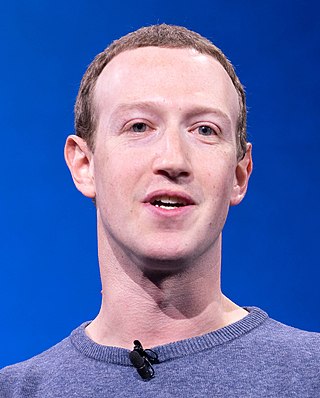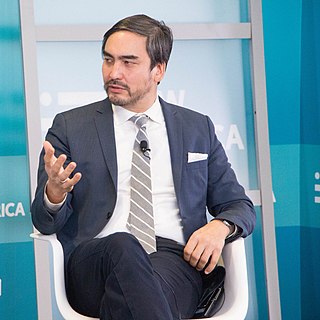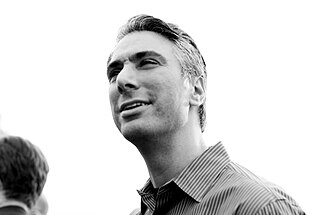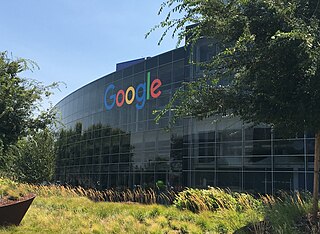Related Research Articles

In business theory, disruptive innovation is innovation that creates a new market and value network or enters at the bottom of an existing market and eventually displaces established market-leading firms, products, and alliances. The concept was developed by the American academic Clayton Christensen and his collaborators beginning in 1995, and has been called the most influential business idea of the early 21st century. Lingfei Wu, Dashun Wang, and James A. Evans generalized this term to identify disruptive science and technological advances from more than 65 million papers, patents and software products that span the period 1954–2014. Their work was featured as the cover of the February 2019 issue of Nature and was included among the Altmetric 100 most-discussed work in 2019.

Lester Lawrence Lessig III is an American legal scholar, academic, and political activist. He is the Roy L. Furman Professor of Law at Harvard Law School and the former director of the Edmond J. Safra Center for Ethics at Harvard University. Lessig was a candidate for the Democratic Party's nomination for president of the United States in the 2016 U.S. presidential election but withdrew before the primaries.

Eric Emerson Schmidt is a former American business executive and software engineer who served as the CEO of Google from 2001 to 2011 and the company's executive chairman from 2011 to 2015, as executive chairman of parent company Alphabet Inc. from 2015 to 2017, and Technical Advisor at Alphabet from 2017 to 2020.

Michael Demaree McCurry is best known for having served in Bill Clinton's administration as the nation's 20th White House Press Secretary. He is a Washington-based communications consultant and is associated with the firm Public Strategies Washington, Inc. He is also active within the administration of the United Methodist Church, serving as a lay delegate to the Church General Conference and on various denominational boards. He currently co-chairs the Commission on Presidential Debates. Born in Charleston, South Carolina, he was educated at Princeton University and Georgetown University.

Accenture plc is an Irish-American professional services company based in Dublin, specializing in information technology (IT) services and consulting. A Fortune Global 500 company, it reported revenues of $61.6 billion in 2022. Accenture's current clients include 91 of the Fortune Global 100 and more than three-quarters of the Fortune Global 500. As of 2022, Accenture is considered the largest consulting firm in the world by number of employees.

Clayton Magleby Christensen was an American academic and business consultant who developed the theory of "disruptive innovation", which has been called the most influential business idea of the early 21st century. Christensen introduced "disruption" in his 1997 book The Innovator's Dilemma, and it led The Economist to term him "the most influential management thinker of his time." He served as the Kim B. Clark Professor of Business Administration at the Harvard Business School (HBS), and was also a leader and writer in the Church of Jesus Christ of Latter-day Saints. One of the founders of the Jobs to Be Done development methodology.

Mark Elliot Zuckerberg is an American business magnate, internet entrepreneur, and philanthropist. He is known for co-founding the social media website Facebook and its parent company Meta Platforms, of which he is the executive chairman, chief executive officer, and controlling shareholder.

Timothy "Tim" Shiou-Ming Wu is a Taiwanese American legal scholar who served as Special Assistant to the President for Technology and Competition Policy from 2021 to 2023. He was also a professor of law at Columbia University and a contributing opinion writer for The New York Times. He is known legally and academically for significant contributions to antitrust and communications policy, coining the phrase "network neutrality" in his 2003 law journal article, Network Neutrality, Broadband Discrimination. In the late 2010s, Wu was a leading advocate for an antitrust lawsuit directed at the breakup of Facebook.
Thomas Hayes "Tom" Davenport, Jr. is an American academic and author specializing in analytics, business process innovation, knowledge management, and artificial intelligence. He is currently the President’s Distinguished Professor in Information Technology and Management at Babson College, a Fellow of the MIT Initiative on the Digital Economy, Co-founder of the International Institute for Analytics, and a Senior Advisor to Deloitte Analytics.

David Weinberger is an American author, technologist, and speaker. Trained as a philosopher, Weinberger's work focuses on how technology — particularly the internet and machine learning — is changing our ideas, with books about the effect of machine learning’s complex models on business strategy and sense of meaning; order and organization in the digital age; the networking of knowledge; the Net's effect on core concepts of self and place; and the shifts in relationships between businesses and their markets.

Julius Genachowski is an American lawyer and businessman. He became the Federal Communications Commission Chairman on June 29, 2009. On March 22, 2013, he announced he would be leaving the FCC in the coming weeks. On January 6, 2014, it was announced that Genachowski had joined The Carlyle Group.

Kevin Werbach is an American academic, businessman and author. In 2002, he founded the Supernova Group, a technology analysis and consulting firm. Since 2004, Werbach is an Associate Professor of Legal Studies and Business Ethics at The Wharton School, University of Pennsylvania. He writes about business, policy, and social implications of emerging Internet and communications technologies.

Susan P. Crawford is the John A. Reilly Clinical Professor of Law at Harvard Law School. She served as President Barack Obama's Special Assistant for Science, Technology, and Innovation Policy (2009) and is a columnist for WIRED. She is a former Board Member of ICANN, the founder of OneWebDay, and a legal scholar. Her research focuses on telecommunications and information law.

Ben Parr is an American journalist, author, venture capitalist and entrepreneur. He is the author of Captivology: The Science of Capturing People's Attention, a book on the science and psychology of attention and how to capture the attention of others. He is the President and co-founder of Octane AI, a marketing automation and conversational marketing company for E-commerce. He was previously a venture capitalist, the co-editor and editor-at-large of Mashable, and a columnist and commentator for CNET. In 2012, he was named to the Forbes 30 Under 30.
Net bias is the counter-principle to net neutrality, which indicates differentiation or discrimination of price and the quality of content or applications on the Internet by ISPs. Similar terms include data discrimination, digital redlining, and network management.
Scott D. Anthony is an author and senior partner at growth strategy consulting firm Innosight.
Creative disruption was introduced in 1992 by TBWA's chairman Jean-Marie Dru. It refers to a radical change in a marketplace brought about by the overturning of existing conventions.

Daniel Burrus is an American technology futurist, business adviser, author, and public speaker in the areas of business strategy, global trends, and disruptive innovation. He has written on the topics of business transformation and technology-driven trends, with his book Flash Forsight becoming a New York Times Bestseller in 2011.

Alphabet Inc. is an American multinational technology conglomerate holding company headquartered in Mountain View, California. It was created through a restructuring of Google on October 2, 2015, and became the parent company of Google and several former Google subsidiaries. Alphabet is the world's third-largest technology company by revenue and one of the world's most valuable companies. It is one of the Big Five American information technology companies, alongside Amazon, Apple, Meta, and Microsoft.
Samsung Strategy and Innovation Center (SSIC) is a division of Samsung Electronics. It works with entrepreneurs and corporate partners to invest in disruptive technologies, such as artificial intelligence, digital health, mobility, Internet of Things and other consumer-facing applications of data-driven technology.
References
- ↑ Crovitz, L. Gordon (2005-10-15). "Books on Business and the Internet". Wall Street Journal. ISSN 0099-9660 . Retrieved 2019-07-28.
- ↑ Columnist. "Larry Downes". The Washington Post. Retrieved 14 July 2019.
- ↑ Contributor. "Larry Downes". Harvard Business Review. Retrieved 14 July 2019.
{{cite web}}:|last1=has generic name (help) - ↑ Downes, Larry. "Laws of Disruption". Forbes. Retrieved August 4, 2011.
- ↑ Contributor. "Larry Downes". CNET. Retrieved 14 July 2019.
{{cite web}}:|last1=has generic name (help) - ↑ Downes, Larry (February 15, 2011). "Ensuring Competition on the Internet: Net Neutrality & Antitrust" (PDF). p. 46. Archived from the original (PDF) on November 2, 2011. Retrieved August 4, 2011.
- ↑ "Larry Downes - Law of Disruption". Forbes. Retrieved 2023-01-14.
- ↑ Downes, Larry (October 7, 2002). "'Free the Mouse' for creativity's sake". USA Today. Retrieved August 4, 2011.
- ↑ "Search larry downes". hbr.org. Retrieved 2023-01-14.
- ↑ "Larry Downes - The Washington Post". Larry Downes. Retrieved 2023-01-14.
- ↑ "Search Results larry downes". sloanreview.mit.edu. Retrieved 2023-01-14.
- ↑ "The Evolution of Regulation and Innovation Project at the Georgetown Center for Business and Public Policy". March 28, 2014. Retrieved October 14, 2016.